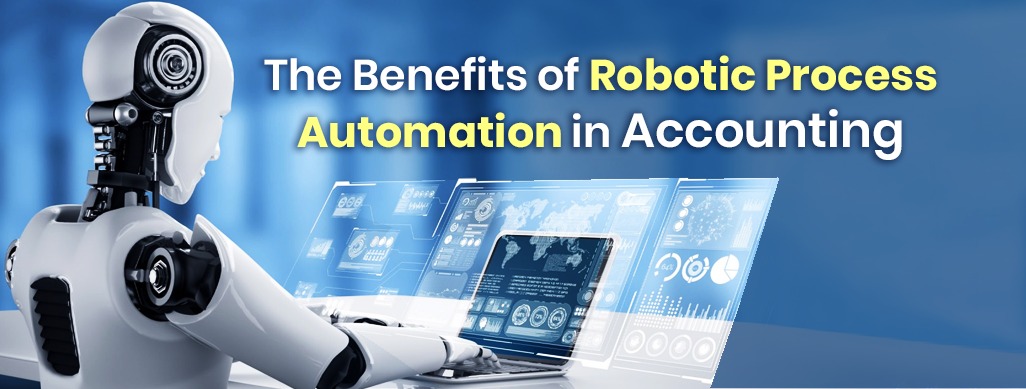
We use cookies to ensure that we give you the best experience on our website.
By using this site, you agree to our use of cookies. Find out more.
This blog delves into the myriad benefits of implementing RPA in accounting, exploring how it can revolutionize data entry, eliminate errors, enhance scalability, and ultimately drive operational excellence within organizations.

In the fast-paced world of modern business, efficiency and accuracy are paramount to success. The accounting and finance sectors, in particular, are under constant pressure to streamline operations, reduce costs, and ensure compliance with ever-changing regulations. Enter Robotic Process Automation (RPA), a revolutionary technology that promises to transform the way accounting processes are executed. RPA harnesses the power of software robots, or "bots," to automate repetitive, rule-based tasks, freeing up valuable human resources to focus on more strategic and complex endeavors. This blog delves into the myriad benefits of implementing RPA in accounting, exploring how it can revolutionize data entry, eliminate errors, enhance scalability, and ultimately drive operational excellence within organizations.
Robotic Process Automation (RPA) is an innovative technology that enables the automation of repetitive, rule-based tasks by mimicking the actions of a human interacting with computer systems and applications. At its core, RPA utilizes software robots or "bots" that are programmed to capture data, interpret applications, trigger responses, and communicate with other systems, just like a human worker would. These bots can seamlessly navigate through various applications, websites, and databases, retrieving and processing information, performing calculations, and executing transactions without the need for manual intervention. Unlike traditional automation solutions that require extensive coding and system integration, RPA operates at the user interface level, making it highly flexible and adaptable to existing IT infrastructures. By automating routine and labor-intensive tasks, RPA empowers organizations to streamline operations, reduce costs, enhance accuracy, and ultimately boost productivity, enabling human workers to focus on more strategic and value-adding endeavors.
Robotic Process Automation (RPA) can be used in a variety of ways within the accounting and finance functions of an organization. Here are some common applications:
By implementing RPA in these areas, accounting and finance teams can significantly reduce manual effort, improve accuracy, and enhance overall operational efficiency, allowing them to focus on higher-value activities and strategic decision-making.
Here are some key benefits of using Robotic Process Automation (RPA) in accounting:

One of the most significant benefits of implementing Robotic Process Automation (RPA) in accounting is the elimination of manual data entry. Traditionally, accounting professionals have spent countless hours manually inputting data from various sources into spreadsheets, accounting software, and other systems. This tedious and error-prone process not only consumes valuable time but also increases the risk of mistakes, which can have far-reaching consequences. With RPA, software bots can seamlessly extract data from multiple sources, such as invoices, bank statements, and financial reports, and automatically input it into the relevant systems. This automation not only streamlines the data entry process but also ensures accuracy and consistency, reducing the potential for human errors and freeing up accounting professionals to focus on more strategic and value-adding tasks.
In the realm of accounting, where precision and accuracy are paramount, the elimination of mistakes through Robotic Process Automation (RPA) is a game-changer. Unlike humans, who are susceptible to errors due to fatigue, distractions, or oversights, RPA software operates based on predefined rules and algorithms, ensuring consistent and error-free execution. By automating tasks such as data entry, calculations, and reconciliations, RPA significantly reduces the risk of mistakes that can arise from manual processes. This enhanced accuracy not only minimizes the time and resources required for error correction but also instills confidence in the financial reports and statements generated. Furthermore, the elimination of mistakes through RPA helps organizations maintain compliance with accounting standards and regulations, avoiding costly penalties and legal implications. Ultimately, the reduced margin of error enabled by RPA translates into improved decision-making, increased operational efficiency, and a competitive advantage for businesses in the ever-evolving financial landscape.
Implementing Robotic Process Automation (RPA) in accounting processes can significantly reduce the number of employees involved, leading to substantial cost savings and increased efficiency. By automating repetitive and time-consuming tasks, such as data entry, invoice processing, and reconciliations, RPA bots can handle workloads that would typically require multiple human resources. This reduction in the workforce requirement not only translates into direct cost savings in terms of salaries and benefits but also indirectly by minimizing the need for additional office space, equipment, and training expenses. Furthermore, by alleviating employees from mundane and tedious tasks, RPA enables accounting professionals to focus their efforts on higher-value activities, such as financial analysis, strategic planning, and decision-making. This shift towards more productive and rewarding work can improve employee satisfaction, retention, and overall productivity, ultimately driving the organization's growth and competitiveness in the market.
Robotic Process Automation (RPA) in accounting offers significant cost savings, making it an attractive proposition for organizations seeking to optimize their financial operations. By automating repetitive and labor-intensive tasks, RPA reduces the need for human resources, translating into substantial savings on salaries, benefits, and associated overhead costs. Additionally, the efficiency and accuracy of RPA minimize the time and resources required for error correction, further contributing to cost reductions. Moreover, RPA solutions often have lower implementation and maintenance costs compared to traditional software systems, providing a cost-effective alternative for process automation. The scalability of RPA also allows organizations to adjust their automation capabilities based on changing workloads, avoiding unnecessary expenses during periods of low demand. By streamlining accounting processes and minimizing errors, RPA can also lead to indirect cost savings through improved compliance, reduced penalties, and enhanced productivity, ultimately driving profitability and competitive advantage for businesses in the long run.
Scalability is a key advantage of implementing Robotic Process Automation (RPA) in accounting operations. Unlike traditional software solutions, which often require extensive modifications and resources to accommodate growth or fluctuations in workload, RPA offers unparalleled flexibility. As an organization's accounting needs evolve, whether due to business expansion, seasonal variations, or changing regulatory requirements, RPA can seamlessly scale up or down to meet these demands. With RPA, additional bots can be rapidly deployed or existing ones reconfigured to handle increased workloads, eliminating the need for costly and time-consuming hiring processes. Conversely, during periods of lower activity, bots can be temporarily deactivated or reassigned, optimizing resource utilization and minimizing unnecessary expenditures. This agility not only enhances operational efficiency but also enables businesses to respond swiftly to market changes, seize new opportunities, and maintain a competitive edge in the dynamic business landscape.
The integration of Robotic Process Automation Services (RPA) in accounting operations presents a transformative opportunity for businesses seeking to optimize their financial processes, reduce costs, and gain a competitive edge. By automating tedious and error-prone tasks, RPA not only enhances efficiency and accuracy but also enables accounting professionals to redirect their efforts towards higher-value activities, such as financial analysis, strategic planning, and decision-making. As technology continues to evolve, the potential applications of RPA in accounting will only expand, offering organizations the agility to adapt and thrive in an ever-changing business landscape. Embracing RPA is not merely a matter of streamlining operations; it is a strategic investment in the future of accounting, paving the way for increased productivity, improved compliance, and sustained profitability. Organizations that recognize the transformative power of RPA and integrate it into their accounting processes will undoubtedly gain a competitive advantage, positioning themselves at the forefront of innovation and operational excellence.
Leave a Comment
Your email address will not be published.